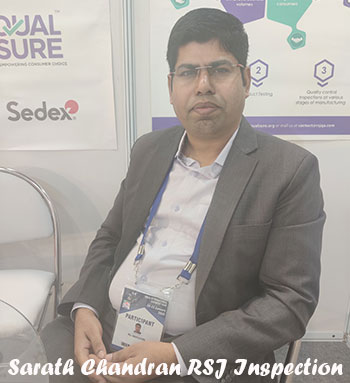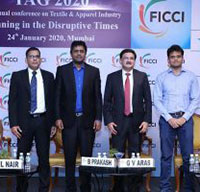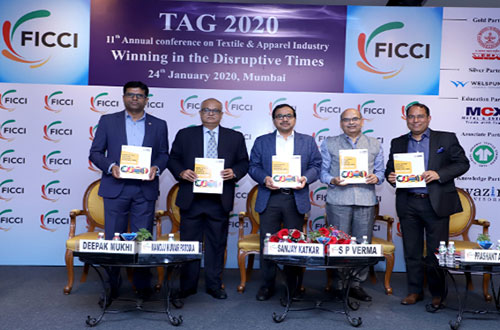FW
Among the investor friendly initiatives taken in the budget are abolishing the dividend distribution tax. This is likely to promote more FDI in the manmade fiber segment including processing textile machinery manufacturing in the country.
Another milestone of the budget is the National Technical Textiles Mission with a four-year implementation period from 2020-21 to 2023-24 at an estimated outlay of Rs 1480 crores. The technical textile segment is a sunrise sector in the entire textile industry in which nearly 90 per cent of the fibers used are manmade fibers. The National Technical Textiles Mission is expected to lift the Indian manmade fiber textile segment to a greater height and lead to a growth in per capita consumption of manmade fibers in India. At the same time this initiative is seen as helping generate more employment in the country. Similarly steps initiated toward boosting infrastructure are meant to address the existing infrastructural gap for export and structural issues in the country. The budget has also taken steps for encouraging Make in India initiatives by protecting domestic manufacturing units. Moreover digital refunds of state and central taxes to exporters will help the entire textile industry. The MSME turnover threshold for audit has been increased to Rs 5 crores from the existing Rs 1 crore.
The non-readymade garment sector in Bangladesh has failed to reap full advantage of the bonded warehouse facility. Bangladesh provides duty-free import benefits to exporters under the bonded warehouse scheme but the benefit is mostly enjoyed by apparel exporters. The scheme allows duty-free imports of raw materials of export items. Export diversification is linked to the existence of the bonded warehouse facility as it provides scope to buy raw materials at international prices.
Around 84 per cent of Bangladesh’s export basket is filled up by readymade garments. High tariffs to protect domestic industries have deterred producers in other industries from exporting and instead made them cater to the domestic market. If these manufacturers have access to bonded warehouse benefits they can think of export diversification. Bangladesh’s source of cost competitiveness is low-cost labor but raw materials and intermediate goods are subject to tariffs. To be competitive, Bangladeshi exporters need to be guaranteed imported inputs at world prices. That is, imports must be available at duty-free prices, upfront. Bonded warehouse benefits ensure duty-free imports, creating a level playing field on the global market. This will ensure labor cost advantages can be exploited fully. As long as tariffs exist and remain high, the bonded warehouse benefit is a must for export success.
A group of textile companies recently approached the Directorate General of Trade Remedies (DGTR) against a move by Reliance Industries and India Glycols seeking imposition of anti-dumping duties on a raw material used to make polyester. In a letter to DGTR, an association representing companies like Indo Rama Synthetics India, Filatex India, Garden Silk Mills and Bombay Dyeing, Director General BS Bhalla have argued that imposing such a duty on the material — mono ethylene glycol (MEG) — would lead to a ‘significant’ loss to India’s textile units. It would increase the cost of textiles and the ability of textile units to increase the prices commensurate with the increase in costs is very limited.
The association, which represents 21 end users claiming to account for two million metric tonne per year of MEG consumption, also submitted that India’s current MEG production capacity fell short of the demand of the product by around 36 per cent.
India imported around $532 million worth of ethylene glycol from countries in 2018-19, and around $320.18 million between April and November 2019, according to data from the Commerce Ministry. Kuwait, Saudi Arabia, Singapore and United Arab Emirates were the top exporters of this product to India last fiscal.
Last year, Reliance Industries — in a petition supported by India Glycols — had alleged that there was dumping of MEG from the abovementioned countries as well as Oman.
The Hague Court of Appeals has ruled Adidas does not have the exclusivity of three bands throughout the Benelux territory and in other international markets. The case dates to 1997 when the brand denounced H&M for the use of the two bands for its line of sportswear. After 23 years of litigation, the Swedish chain has won the case.
The Court of Appeal has considered that market research suggests that consumers can hardly associate the H&M sports fashion line with that of Adidas. The ruling also states that only 10 per cent of the consumers named Adidas after viewing H&M’s striped work out clothing. The German brand must pay H&M €80,000 as legal costs for the trial, although it may still appeal the judgment before the Supreme Court of the Netherlands.
This is not the first legal blow that Adidas receives on the use of its brand image. In June last year, the European Union also voted against the German company to being able to appropriate the three bands in the community area, which opened the door for other companies to sell items that incorporated these designs.
 An independent third party inspection service company, RSJ Inspection works as a quality control partner for securing Indian imports. The company was recently accredited as the rating agency for the zero defect initiative (ZED) launched by the Indian government. Sarath Chandran, Director of the company elaborates on this initiative.
An independent third party inspection service company, RSJ Inspection works as a quality control partner for securing Indian imports. The company was recently accredited as the rating agency for the zero defect initiative (ZED) launched by the Indian government. Sarath Chandran, Director of the company elaborates on this initiative.
The Zero Defect Initiative supports the Make in India Campaign. “Though this campaign took off well, it later faced problems,” says Sarath Chandran, Director of the company. “Therefore, we started these, zero defect and zero effect initiatives. Over 50 countries have signed MoUs to use this standard in their countries,” he adds.
Enhancing global competitiveness of MSME countries
The aim of this initiative is to enhance global competitiveness of India’s MSME countries. “Before its inputs being used, the initiative was tested with several companies. Any Indian MSME can apply for this initiative free of cost. It can go to the website, register and get itself assessed free of cost,” avers Chandran.
The 50 parameters of this initiative suit all manufacturers and help them to go to the next level. These parameters include finance, people management, property, environment, safety, intellectual property rights. In finance, one of the parameters is turnover growth; another is profit. “If a company manages to achieve a particular turnover it’s known as a world class company. If it reaches a normal level it is at level 3. Any company that aims to reach these benchmark figures on its own has to spend heavily. However, this is a readymade package that aims to transform the quality of culture in India,” states Chandran.
Low awareness leads to reduced application
When the scheme was launched, the target was to reach 22,000 manufacturers. However, response to it was poor despite awareness seminars being held across India. The scheme mostly benefitted associations, clusters and some original equipment manufacturers in automobiles. However, the application of this scheme in Apparel and Textile (T&C) is still low as awareness is low.
The concept of zero defect sounds scary to some people. “However, it is a good target to achieve. Its intention is to give incentives to certified factories. The scheme operates through a few banks. In Himachal Pradesh or Punjab, if you get a Z certification, you can avail of MSME benefits like electricity subsidy within three years,” affirms Chandran.
Currently only two companies in the textile and apparel sector have been certified. Of this, one is in Ludhiana, another is in Delhi NCR. There is also a leather company in Chennai.
The desktop cost of the documentation of a micro MSME is Rs 2000. “It is actually Rs 10,000 with a 80 percent subsidy. For a small company, this cost is Rs 4000, for medium size company, it is Rs 6000. The actual cost of factory assessment is Rs 80,000. But this comes with a 80 percent subsidy for a micro company, a 60 per cent subsidy for a small company and a 40 per cent subsidy for a medium company,” adds Chandran.
Once a company receives this certification, it may want to reach the next level. “For this, it can get five- day training and, qualified consultants. A Z-certified company is one to which orders can readily be given,” notes Chandran. The scheme benefits export promotion councils of India.
"A new report ‘Winning in Disruptive Times’ by FICCI-Wazir Advisors says, in order to compete with global counterparts, India needs to upgrade its manufacturing standards and service orientation. Also, Indian companies need to build digitally enabled smart factories besides focusing on skilling of middle and top management to build efficient and service oriented business."
 A new report ‘Winning in Disruptive Times’ by FICCI-Wazir Advisors says, in order to compete with global counterparts, India needs to upgrade its manufacturing standards and service orientation. Also, Indian companies need to build digitally enabled smart factories besides focusing on skilling of middle and top management to build efficient and service oriented business.
A new report ‘Winning in Disruptive Times’ by FICCI-Wazir Advisors says, in order to compete with global counterparts, India needs to upgrade its manufacturing standards and service orientation. Also, Indian companies need to build digitally enabled smart factories besides focusing on skilling of middle and top management to build efficient and service oriented business.
Ability to take risk and align with emerging trends
The report was released at the FICCI TAG 2020 Seminar held in Mumbai. Presenting the report, Prashant Agarwal, Co-Founder and Joint MD, Wazir Advisors emphasised on the government’s role in neutralising cost disadvantage with global competitors and building infrastructure for producing large scale manufacturing zones. He said, we need to have better risk taking capabilities and ability to speedily align with emerging mega trends to remain in the business.
Improving product speed and quality
RD Udeshi, President-Polyester Chain, Reliance Industries stressed upon the need to improve the speed and quality of product deliveries as per international standards besides focusing on value addition and skill development. He pointed out, India’s manufacturing excellence and scale of its factories gives it an advantage over competitors like China, Bangladesh, and Vietnam etc.
quality of product deliveries as per international standards besides focusing on value addition and skill development. He pointed out, India’s manufacturing excellence and scale of its factories gives it an advantage over competitors like China, Bangladesh, and Vietnam etc.
Rahul Mehta, Chief Mentor, CMAI advised Indian manufacturers to start manufacturing clothes closer to the place of raw material and cheaper labor instead of being close to the market. “Agility, speed and transparency” are the key factors to win in disruptive times, felt Rajendra K Rewari, Executive Director and CEO, Morarjee Textiles. He advised manufacturers to attract young talent in the business by offering adequate remuneration.
Roadmap to deal with challenges
The theme of TAG 2020 conference was very contemporary and it offered an excellent platform for giving a clear roadmap to overcome the current challenges that the industry is facing. Applauding the conference, Sharan, Director, India Operations, Saurer Textile Solutions said that it deliberated on relevant topics such as surviving through disruptive times, sustainability, size and scale of business, investments and interventions for winning the global race. The conference upheld the view proposed by Anil Nair, President, Shubhalakshmi Polyester that India should aim to be a superior textile producer through innovation, technology, versatile fiber availability and ample manpower resources.
Three textile fairs of Messe Frankfurt in Shanghai will be postponed from March to a later date due to the Novel Coronavirus outbreak. This includes Intertextile Shanghai Apparel Fabrics – Spring Edition, Yarn Expo Spring and Intertextile Shanghai Home Textiles – Spring Edition which were due to be held in Shanghai from 11 – 13 March at the National Exhibition and Convention Center.
This follows the recent announcement that the company’s other fairs to be held in China in the coming two months – Prolight + Sound Guangzhou, SPS – Industrial Automation Fair Guangzhou (SIAF) and Asiamold in Guangzhou, and Toy & Edu, Baby & Stroller and Licensing China in Shenzhen – have also been postponed until later in the year.
Intertextile Shanghai Apparel Fabrics is co-organised by Messe Frankfurt (HK) Ltd; the Sub-Council of Textile Industry, CCPIT; and the China Textile Information Centre. The co-organisers of Yarn Expo Spring are Messe Frankfurt (HK) Ltd and the Sub-Council of Textile Industry, CCPIT. Intertextile Shanghai Home Textiles is co-organised by Messe Frankfurt (HK) Ltd; the Sub-Council of Textile Industry, CCPIT; and the China Home Textile Association (CHTA). All three fairs are held concurrently with the PH Value and CHIC textile fairs, which will also be postponed.
Messe Frankfurt’s China textile fairs form a part of the company’s Texpertise Network, which consists of some 50 fairs around the world. More information can be found
In its ambitious ‘Fashion Pact’,luxury brand set following objectives for 2025: to reduce its environmental impact by 40 per cent and cut its CO2 emissions in half, compared to results from 2015. All of this is to be achieved with entirely traceable raw materials and on the same timetable.
From 2015 to 2018, the brand reduced its ‘environmental global impact’ by 14 per cent and its greenhouse gas emissions by 36 per cent. Across the same period, the greenhouse gas emissions related to its stores and other worldwide placements were reduced by 77 per cent.
The group will use renewable energy sources for 67 per cent of its operations. It has reached 100 per cent in seven countries and is at 78 per cent in Europe. In 2018, the company became carbon neutral across its entire business and supply chain, including through forest protection programs.
Moreover, Kering has put in place new standards for raw materials and manufacturing processes. This has formalized the best procedures in terms of environmental protection, social compliance, traceability, the use of chemicals and the wellbeing of animals. These measures have already been implemented across 68% of the group’s suppliers.
The Clothing Manufacturers Association of India (CMAI) has welcomed the Union Budget presented by Finance Minister Nirmala Sitharaman on February 1, 2020 as positive and growth oriented for the apparel industry. Rakesh Biyani, President of the association says the most important step in this Budget for the textile industry was the removal of the anti-dumping duty on PTA, which was a long standing demand of the textile manufacturing value chain. This will potentially open up the MMF value chain, and give a fillip to the entire MMF industry and enhance its global competitiveness.
According to Biyani several other measures could also benefit the textile industry such as the technical textile mission, a review of the Rules of Origin especially in our FTAs, a review of cheap imports of goods being made by our MSME Sector, refund of all the taxes and levies for exports, and the targeting of making every district an export hub. The proposed financing of invoices of the MSME sector could again be a huge benefit to the Industry, which is largely comprised of the MSME units.
Levi Strauss is set to open 100 stores in 2020, as the denim giant is seeing strong gains on the international front and in e-commerce. The brand posted a 3 per cent gain in net revenue in the first quarter of the fiscal year. The company expects its net revenue to grow by 6 per cent in fiscal 2020 This estimate incorporates anticipated benefits of a Black Friday week in the first quarter, and a 53rd week, which will fall in the fourth quarter and will include a second Black Friday.
During the fiscal, Levi’s adjusted earnings before interest and taxes (EBIT) margin expansion is expected in the range of 30 to 40 basis points, reflecting gross margin expansion partially offset by an increase in adjusted sales, general and advertising (SG&A) expense as a percentage of revenues. Its adjusted diluted earnings per share (EPS) are forecast in the range of $1.18 to $1.22.
Capital expenditures are expected to be approximately $200 million to $210 million, with nearly 100 new company-operated store openings on a gross basis in 2020, in addition to 80 stores from the company’s acquisition in South America.












